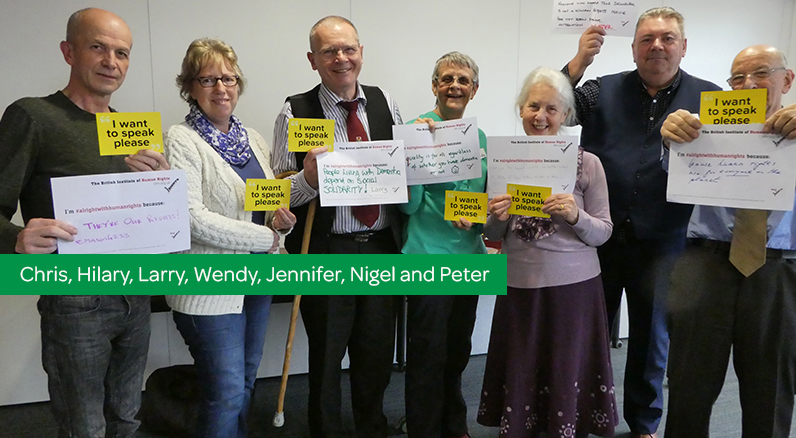
Dementia Voices
From early on we were determined to support people with dementia to have a say in decisions that affect their lives, as we believed that we all had a right for our voices to be heard.
One of our first projects was to make films with people with dementia. We originally wanted people with dementia to present a series of videos about dementia as way of challenging stereotypes about what they were capable of doing. …but people told us they were frankly bored with talking about dementia and wanted instead to make films about things they find more interesting.
We think the videos we eventually made carried a much more powerful message about the lives and aspirations of people with dementia, and broke down a lot more stereotypes than those we had originally planned. They were also a lot more fun.
We have found that this often happens when people with dementia are in control.
You can see the films here – as well as more about our work to support people with dementia to have a say.
DEEP
DEEP stands for the Dementia Engagement and Empowerment Project – the UK network of Dementia Voices. The network connects groups of people with dementia who are working together to:
- raise awareness about dementia
- give views to people who write policies about dementia
- influence local dementia services
- challenge other people’s views about what it is like to live with dementia
Innovations in Dementia supports the DEEP network by:
- Putting groups in touch with each other – to share ideas
- Getting groups involved in national dementia policies
- Collecting examples of different ways that groups work
- Writing monthly updates, to tell groups of each other’s work
- Giving out small amounts of funding. This has helped groups to carry out work that they are interested in
- Producing guidance notes to improve the ways that other organisations work with people with dementia.
DEEP is supported by Innovations in Dementia. The funders are Joseph Rowntree Foundation, Comic Relief and Life Changes Trust (for work in Scotland). There are almost 100 DEEP groups, who are all doing amazing work.
Dementia Diaries
Dementia Diaries is an innovative project which uses audio diaries to bring us a wide range of voices of people living with dementia.
The brainchild of On Our Radar, Dementia Diaries has now been integrated into DEEP, and is led by Rachel Niblock and Philly Hare. People with dementia are supported as ‘reporters’. They can use a landline, a mobile, emails or an OwnFone at any time to file their reports – which range from the very personal to the very political! The project has huge potential to educate, to challenge attitudes, to connect and to motivate.
Click here to visit the Dementia Diaries Website
Dementia words matter
The language we use about dementia affects how people think and feel about dementia.
“Words are very powerful – they can build you up or put you down. When you are speaking about dementia remember this.” (Agnes Houston, person with dementia). We want everyone to think carefully about the language they use in relation to dementia and in particular to avoid ‘curl up and die’ words such as sufferer and victim.
We recognise that it is going to take collective action to fundamentally change the choice of words that are used to describe dementia and its day to day experiences.
Dementia Words Matter
The Dementia Engagement and Empowerment Project (DEEP) and the Dementia Action Alliance (DAA) have joined forces in a Call to Action around ‘Dementia Words Matter’.
Find out more at the DAA website: https://bit.ly/2r2mwwA
‘I am not a victim’: Tips for reporting on dementia
Dementia Diaries produced an article where people living with dementia discuss how the media can better phrase its coverage of the illness.
Go to: https://bit.ly/1NfLO01 (17 August 2015)
Dementia words matter: guidelines on language about dementia
This guidance is for journalists, organisations and communications departments.
The language we use to talk about dementia influences how people with dementia are viewed and also how they feel about themselves. People with dementia prefer words and descriptions that are accurate, balanced and respectful.
Other resources
- Dementia without Walls – reflections from people with dementia on how people with dementia have been involved… Read more
- Developing a national user movement of people with dementia… Read more
- The Impact of Dementia Activism… Read more
- A story about me – Liz… Read more
- A story about Peter… Read more
- Window of Opportunity… Read more
Innovations in Dementia Videos by people with dementia
You can see the videos we made here

